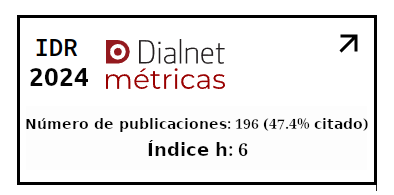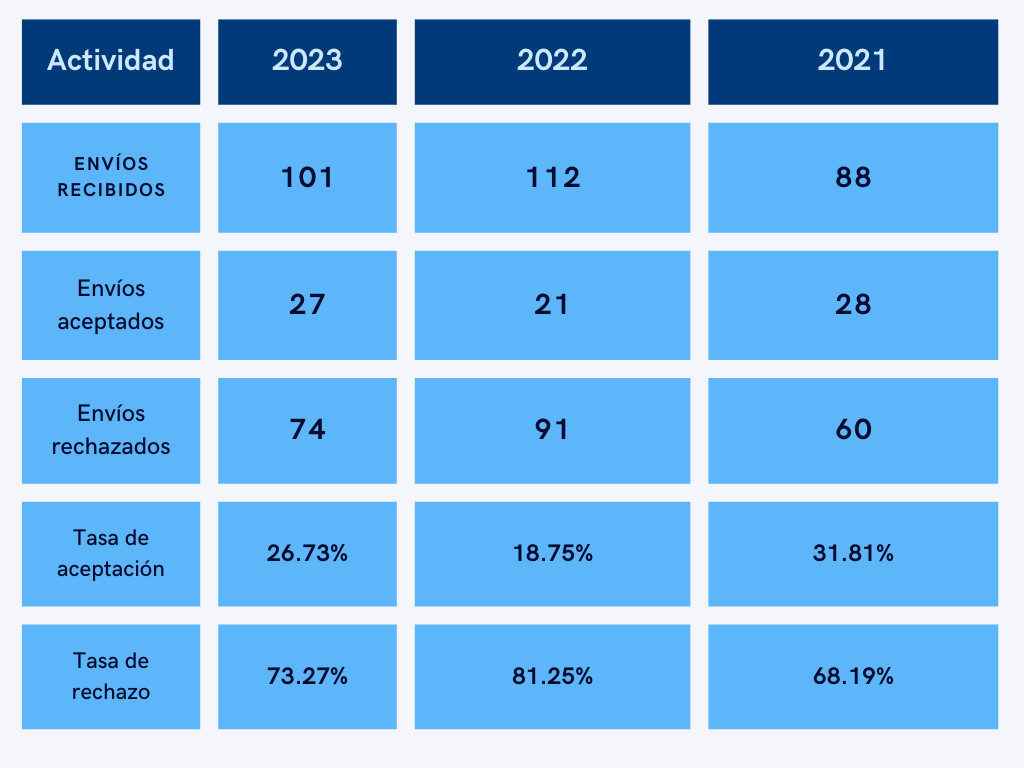Rupturas en la alianza terapéutica y su asociación con cambio y abandonos tempranos en psicoterapia
Palabras clave:
Investigación psicológica, efectos psicológicos, diferencia individualResumen
Con el objetivo de estudiar los procesos de rupturas en la alianza terapéutica y su vínculo con los cambios terapéuticos y abandonos tempranos en psicoterapia. Se analizaron quince pacientes de psicoterapia diagnosticados con trastornos emocionales y divididos en tres grupos, cada uno con cinco participantes: pacientes que abandonaron, que presentaron mejorías clínicas y que no presentaron mejorías. Las primeras cuatro sesiones de los participantes fueron analizadas por cuatro jueces usando el Sistema de Ranqueo y Resolución de Rupturas-Argentina mediante un método consensual. Posteriormente se analizaron patrones diferenciales de rupturas y resoluciones en los grupos. Se observó un promedio de 1,18 (DE= 1,74) rupturas por sesión, encontrando una proporción equitativa de rupturas de retirada (54,72%) y confrontación (45,28%). El grupo de los pacientes que mejoraron presentó mayor tasa de rupturas resueltas (ratio= 0,50) que el grupo de pacientes sin cambio (ratio= 0,30). No se observaron diferencias entre las rupturas del grupo de abandono y los otros dos grupos. Los resultados sugieren que las rupturas en la alianza no implican una amenaza en sí mismo a los tratamientos (en términos de proceso temprano y de abandonos). Sin embargo, la resolución de dichas rupturas podría favorecer mejores respuestas tempranas.
Descargas
Citas
Allen, L., McHugh, R.,& Barlow, D. (2007). Emotional disorders a unified protocol. En: Barlow, D., (Ed.) Clinical handbook of psychological disorders, (4a ed., pp. 578-614). New York: Guilford Press.
American Psychiatric Association. (2013). Diagnostic and statistical manual of mental disorders (5 ed.). Arlington, VA: American Psychiatric Press.
Bados, A., Balaguer, G.,& Saldaña, C. (2007). The efficacy of cognitive – behavioral therapy and the problem of drop-out. Journal of Clinical Psychology, 63, 585–592. DOI:http://doi.org/10.1002/jclp
Bordin, E. S. (1979). The generalizability of the psychoanalytic concept of the working alliance. Psychotherapy: Theory, Research and Practice, 16, 252–260.
Bradford, A., Cully, J., Rhoades, H., Kunik, M., Kraus-Schuman, C., Wilson, N.,& Stanley, M. (2011). Early response to psychotherapy and long-term change in worry symptoms in older adults with generalized anxiety disorder. The American Journal of Geriatric Psychiatry, 19, 347–356. DOI: http://doi.org/10.1097/JGP.0b013e3181f18061
Coutinho, J., Ribeiro, E., Fernandes, C., Sousa, I.,& Safran, J. D. (2014). The development of the therapeutic alliance and the emergence of alliance ruptures. Anales de Psicología, 30, 985–994.
Coutinho, J., Ribeiro, E., Hill, C.,& Safran, J. (2011). Therapists’ and clients’ experiences of alliance ruptures: A qualitative study. Psychotherapy Research, 21(5), 525-540.
Coutinho, J., Ribeiro, E., Sousa, I.,& Safran, J. (2014). Comparing two methods of identifying alliance rupture events. Psychotherapy, 51(3), 434–442.
de Shazer, S.,& Berg, I. K. (1997). What works?: Remarks on research aspects of solution-focused brief therapy. Journal of Family Therapy, 19, 121–124. DOI:http://doi.org/Doi 10.1111/1467-6427.00043
de Shazer, S., Berg, I. K., Lipchick, E., Nunnally, E., Molnar, A., Gingerich, W.,& Weiner-Davis, M. (1986). Brief therapy: Focused solution development. Family Process, 25, 207–221.
Doran, J. M. (2014). The working alliance: Where have we been, where are we going? Psychotherapy Research, 26, 146–163. DOI: http://doi.org/10.1080/10503307.2014.954153
Eubanks, C.F., Muran, J.C., &Safran, J.D. (2015). Rupture Resolution Rating System (3RS): Manual. Unpublished manuscript, Mount Sinai-Beth Israel Medical Center, New York. Rupture resolution rating system (3RS): Manual (PDF Download Available). Available from: https://www.researchgate.net/publication/270581021_RUPTURE_RESOLUTION_RATING_SYSTEM_3RS_MANUAL
Fernández-Álvarez, H., Hirsh, H., Maristany, M.,& Torrente, F. (2005) Propiedades psicométricas del OQ-45.2 en la Argentina: un estudio piloto. Poster presentado en el 4° Congreso Mundial de Psicoterapia. Buenos Aires.
Gingerich, W. J.,& Eisengart, S. (2000). Solution-focused brief therapy: a review of the outcome research. Family Process, 39, 477–498. DOI:http://doi.org/10.1111/j.1545-5300.2000.39408.x
Gómez Penedo, J. M. (2017). Variables del paciente y del proceso psicoterapéutico vinculadas a predictores tempranos de cambio. Tesis doctoral, Universidad de Buenos Aires, Buenos Aires, Argentina.
Gómez Penedo, J. M., Artiaga, S. y Roussos, A. (2016). Sistema de Ranqueo y Resolución de Rupturas - Argentina. Manuscrito sin publicar.
Haas, E., Hill, R. D., Lambert, M. J.,& Morrell, B. (2002). Do early responders to psychotherapy maintain treatment gains? Journal of Clinical Psychology, 58, 1157–1172.
Holmqvist Larsson, M., Falkenström, F. Andersson, G.,& Holmqvist, R. (2016).Alliance ruptures and repairs in psychotherapy in primary care. Psychotherapy Research. DOI: 10.1080/10503307.2016.1174345
Horowitz, L. M. (1979). On the cognitive structure of interpersonal problems treated in psychotherapy. Journal of Consulting and Clinical Psychology, 47, 5–15.
Horvath, A. O.,& Symonds, B. D. (1991). Relation between working alliance and outcome in psychotherapy: A meta-analysis. Journal of Counseling Psychology, 38, 139–149. DOI: http://doi.org/10.1037//0022-0167.38.2.139
Horvath, A. O., & Greenberg, L. S. (1986).The development of the working alliance Inventory. In L. S. Greenberg & W. M. Pinsof (Eds.), The psychotherapeutic process: A research handbook (pp. 529-556). New York, NY: Guilford Press.
Horvath, A. O., Del Re, A. C., Flückiger, C., & Symonds, D. (2011). Alliance in individual psychotherapy. Psychotherapy, 48, 9–16. DOI: http://doi.org/10.1037/a0022186
Howard, K. I., Kopta, S. M., Krause, M. S.,& Orlinsky, D. E. (1986). The dose-effect relationship in psychotherapy. The American Psychologist, 41, 159–164. DOI: http://doi.org/10.1037/0003-066X.41.2.159
Howard, K. I., Lueger, R. J., Maling, M. S., & Martinovich, Z. (1993). A phase model of psychotherapy outcome: Causal mediation of change. Journal of Consulting and Clinical Psychology, 61, 678–685.
Ilardi, S. S.,& Craighead, W. E. (1994). The role of nonspecific factors in cognitive-behavior therapy for depression. Clinical Psychology: Science and Practice, 1, 138–155. DOI: http://doi.org/10.1111/j.1468-2850.1994.tb00016.x
Jacobson, N. S.,& Truax, P. (1991). Clinical significance: a statistical approach to defining meaningful change in psychotherapy research. Journal of Consulting and Clinical Psychology, 59, 12–19.
Juan, S., Gómez Penedo, J.M., Etchebarne, I. y Roussos, A. J. (2011). El método de investigación cualitativa consensual (Consensual Qualitative Research, CQR): Una herramienta para la investigación cualitativa en psicología clínica. Anuario de investigaciones en Psicología. Facultad de Psicología – UBA, Vol. XVIII, Tomo I, pp. 47-56.
Klein, D. N., Schwartz, J. E., Santiago, N. J., Vivian, D., Vocisano, C., Castonguay, L. G., & Keller, M. B. (2003). Therapeutic alliance in depression treatment: controlling for prior change and client characteristics. Journal of Consulting and Clinical Psychology, 71(6), 997–1006. DOI:10.1037/0022-006X.71.6.997
Lambert, M. J., Burlingame, G. M., Umphress, V., Hansen, N., Vermeersch, D. A., Clouse, G. C.,& Yanchar, S. C. (1996). The reliability and validity of the outcome questionnaire. Clinical questionnaire. Clinical Psychology and Psychotherapy, 3, 249–258.
Lutz, W., Hofmann, S. G., Rubel, J., Boswell, J. F., Shear, M. K., Gorman, J. M., &Barlow, D. H. (2014).Patterns of early change and their relationship to outcome and early treatment termination in patients with panic disorder. Journal of Consulting and Clinical Psychology, 82, 287–97. DOI: http://doi.org/10.1037/a0035535.
Martin, D. J., Garske, J. P., & Davis, M. K. (2000). Relation of the therapeutic alliance with outcome and other variables : A meta-analytic review. Journal of Consulting and Clinical Psychology, 68(3), 438–450. DOI: http://doi.org/10.1037/0022-006X.68.3.438
Mergenthaler, E.,& Gril, S. (1996). Descripción de las reglas para la transcripción de sesiones de psicoterapia. Revista Argentina de Clínica Psicológica, 5(2), 163 – 176.
Muran, J. C., Safran, J. D., Gorman, B. S., Samstag, L. W., Eubanks-Carter, C.,& Winston, A. (2009). The relationship of early alliance ruptures and their resolution to process and outcome in three time-limited psychotherapies for personality disorders. Psychotherapy Theory, Research, Practice, Training,46(2), 233–248.
Roussos, A. J., Gómez Penedo, J. M. y Muiños, R. (2016). A time-series analysis of therapeutic alliance, interventions, and client’s clinical status in an evidence-based single-case study: Evidence for establishing change mechanisms in psychotherapy. Psychotherapy Research. Publicación on-line de avance. http://doi.org/10.1080/10503307.2016.1174346
Rubel, J., Lutz, W.,& Schulte, D. (2013). Patterns of change in different phases of outpatient psychotherapy: A stage-sequential pattern analysis of change in session reports. Clinical Psychology and Psychotherapy, 22, 1–14. DOI: http://doi.org/10.1002/cpp.1868
Safran, J. D.,& Muran, J. C. (2006). Has the concept of the therapeutic alliance outlived its usefulness? Psychotherapy: Theory, Research, Practice, Training, 43, 286–291. DOI: http://doi.org/10.1037/0033-3204.43.3.286
Safran, J. D., Muran, J. C., & Eubanks-Carter, C. (2011). Repairing alliance ruptures. Psychotherapy, 48, 80–87. DOI:http://doi.org/10.1037/a0022140
Safran, J. D., Muran, J. C., & Proskurov, B. (2009). Alliance, negotiation and rupture resolution. En R. A. Levy y J. Stuart Ablon (Eds.), Handbook of evidence based psychodynamic therapy (pp. 201–225). New York: Human Press.
Safran, J. D., Muran, J. C., Samstag, L. W.,& Stevens, C. (2001). Repairing alliance ruptures. Psychotherapy, 38, 406–412.
Safran, J. D., Muran, J. C., Samstag, L. W.,& Stevens, C. L. (2002). Repairing alliance ruptures. En J. C. Norcross (Ed.), Psychotherapy relationships that work(pp. 235–254). New York: Oxford University Press. DOI:http://doi.org/10.1037/a0022140
Sharf, J., Primavera, L. H.,& Diener, M. J. (2010). Dropout and therapeutic and therapeutic alliance: A meta-analysis of adult individual psychotherapy. Psychotherapy Theory, Research, Practice, Training, 47, 637–645. DOI:http://doi.org/10.1037/a0021175
SFBT (Solution-Focused Brief Therapy) Research Committee (2007). Solution focused therapy treatment manual for working with individuals research committee of the solution focused brief therapy association. Recuperado de: http://www.sfbta.org/Research.pdf
Stiles, W. B., Glick, M. J., Osatuke, K., Hardy, G. E., Shapiro, D. A., Agnew-Davies, R., &Barkham, M. (2004). Patterns of alliance development and the rupture-repair hypothesis: Are productive relationships u-shaped or v-shaped? Journal of Counseling Psychology, 51, 81–92. DOI: http://doi.org/10.1037/0022-0167.51.1.81
Strauss, J. L., Hayes, A. M., Johnson, S. L., Newman, C. F., Brown, G. K., Barber, J. P., & Beck, A. T. (2006). Early alliance, alliance ruptures, and symptom change in a nonrandomized trial of cognitive therapy for avoidant and obsessive–compulsive personality disorders. Journal of Consulting and Clinical Psychology, 74(2), 337–345. DOI: 10.1037/0022-006X.74.2.337
Swift, J. K.,& Callahan, J. L. (2011). Decreasing treatment dropout by addressing expectations for treatment length. Psychotherapy Research, 21, 193–200.
Swift, J. K., Greenberg, R. P., Tompkins, K. A., &Parkin, S. R. (2017). Treatment refusal and premature termination in psychotherapy, pharmacotherapy, and their combination: A meta-analysis of head-to-head comparisons. Psychotherapy, 54, 47–57.
Von Bergen, A.,& De la Parra, G. (2002) OQ.45.2 Cuestionario para evaluación de resultados y evolución en psicoterapia: adaptación, validación e indicaciones para su aplicación e interpretación. Terapia Psicológica, 20, 161-176.









